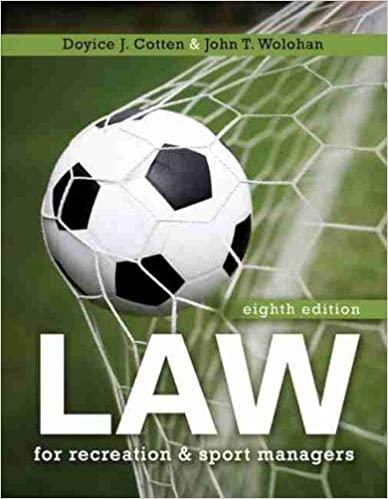Question
11 A significant weakness with Taylor's Scientific Management Principles is that A. not applicable to real life B. it reduces employee motivation C. none D.
11 A significant weakness with Taylor's Scientific Management Principles is that
A.
not applicable to real life
B.
it reduces employee motivation
C.
none
D.
gives too much decision making power to the employee
E.
relies too much on team work
12 Goal setting influences employee behavior and performance mainly by improving
A.
none
B.
distraction
C.
Self confidence
D.
Motivation
E.
learned attitudes
13. Emotional labor is higher in jobs requiring
A.
skilled knowledge
B.
frequent interaction with clients
C.
working in isolation
D.
working in irregular shifts
E.
limited hours of routine work
14. The need for achievement in successfull entrepreneurs tend to be
A.
both low and high
B.
neither high or low
C.
low
D.
nonexistent
E.
high
15. What is influencing oneself to establish the self direction and self motivation needed to perform a task?
A.
self task
B.
self reinforcement
C.
self leadership
D.
self control
E.
self influence
16.Transformational leaders
A.
none
B.
focus on short term goals
C.
direct employees to a new vision
D.
help employees become satisfied with their current jobs
E.
support the current strategy
17. A culture which values formal relationships, obedience to authority and an unequal distribution of power has
A.
low uncertainity avoidance
B.
high collectivism
C.
none
D.
high power distance
E.
high individualism
18. Which is not a factor that favors effective team behavior?
A.
physical layout to support the team
B.
information systems to support the team
C.
works assigned and designed for team
D.
individual rewards
E.
leadership that supports team
19. Which one refers to a person's beliefs about what behaviors are appropriate or necessary in a particular situation?
A.
locus of control
B.
personality problems
C.
competencies
D.
situational factors
E.
role perceptions
20. Which theory explains how people develop perceptions of fairness by comparing their input output ratios with others?
A.
Expectancy
B.
Engagement
C.
Equity
D.
Emotionality
E.
Needs
Step by Step Solution
There are 3 Steps involved in it
Step: 1

Get Instant Access to Expert-Tailored Solutions
See step-by-step solutions with expert insights and AI powered tools for academic success
Step: 2

Step: 3

Ace Your Homework with AI
Get the answers you need in no time with our AI-driven, step-by-step assistance
Get Started


